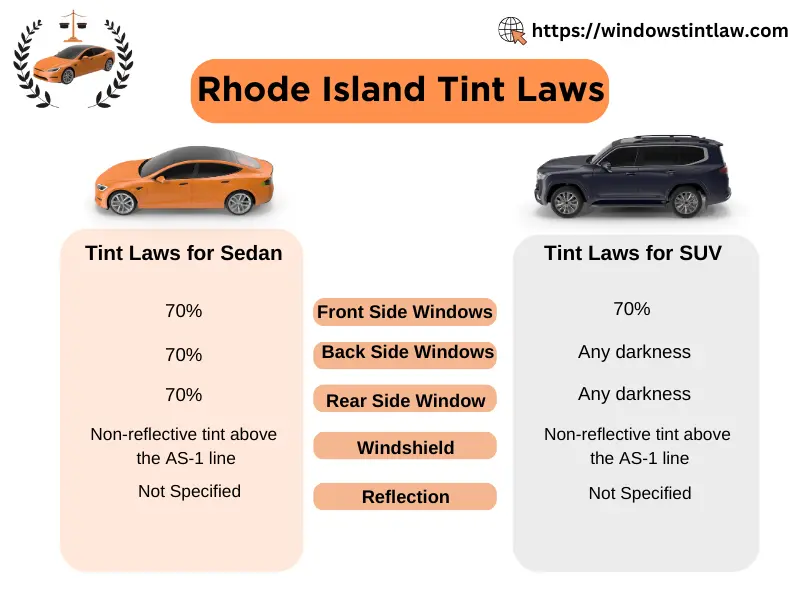Rhode Island tint laws were legislated in 2000 to ensure the safety of drivers and passengers on the road.
Tinted windows offers several advantages but drivers must obey the tint laws to avoid penalties. Window tinting laws are imposed to assure the sufficient amount of Visible Light must pass through vehicle windows.
Check out the below section for complete details about Rhode Island Tint Laws.
Overview of Rhode Island Tint Laws
The below image defines the allowed tint limits for window tint darkness and Tint Reflection. Make sure to follow these limits to avoid Tint tickets and legal actions by the State departments.

Darkest Legal Tint in Rhode Island
Vehicles owners and drivers in Rhode Island must obey the below Window Tinting rules for Cars and SUVs. However, No person shall cover or treat the front windshield with non-transparent or sunscreen material neither reflective nor non-reflective. Any transparent and non-reflective material may only be used up to the top six inches of the windshield.
Regardless of the state in which a vehicle is registered, these regulations apply to all vehicles operated in Rhode Island.
| Vehicle Type | Front Side Windows | Back Side Windows | Rear Window | Windshield | Tint Reflection | Tint Colors |
| Sedan | 70% | 70% | 70% | Non-reflective tint above the AS-1 Line or top 6 inches. | Not Specified. | All Tint colors are allowed. |
| SUV, Vans or Trucks | 70% | Any darkness can be applied | Any darkness can be applied | Non-reflective tint above the AS-1 Line or top 6 inches. | Not Specified. | All Tint colors are allowed. |
Window Tint Reflection
Tint reflection limits are not specified in the RI Tint Laws, but any person shall not install the coating which is mirror-like or shiny in appearance. As the coating materials with higher solar reflectance produces glare due to sunlight and headlamps of other vehicles. The glare cause difficulty in driving for other drivers on the road.
It is recommended to review the type of window tinting materials to choose the right window coating, in accordance with state laws.
Other Rules and Regulations in Rhode Island
Besides window tint darkness limits, there are some other rules which are required to follow:
- Dual Side Mirrors: Two outside mirrors, one on each side is required if the rear window is tinted or coated.
- Restricted Colors: No Tint colors are specifically restricted in the State Laws.
- Stickers or Labels: Window Film installers must provide and affix a label or sticker on the front windshield not to exceed one and half square inches in size, which contains the installer’s name and the percentage of light transmittance.
- Certificates: Manufacturers of tinting or coating materials do not need to certify the film they sell in the state.
Medical Exemption
Any individual with certain medical conditions can obtain the medical exemption from the Tint laws. Applicant should provide an affidavit signed by licensed Physician or Optometrist, which states that applicant has a physical condition which requires to equip vehicle with sun screening material beyond the Federal Standards.
The division of motor vehicles will provide a sticker to be placed on the driver’s side window to identify the medical exemption or Tint waiver.
The Medical Exemption application form can be downloaded from DMV RI website or you can download from the below button.
Tint Tickets in Rhode Island
A maximum punishment of $250 will be imposed on the owner of a motor vehicle who installs any illegal sun screening or tinting materials. Similarly, Any Person, Company or Business who install any sun screen or tinting material in contradiction to Rhode Island Tint Laws shall be fined with not more than $250 for each offense. Additionally, Professional Installers are advised to check the window tint material should meet the requirements of Rhode island tint laws.
Source: Rhode Island General Laws Title 31. Motor and Other Vehicles § 31-23.3-5. Penalties
